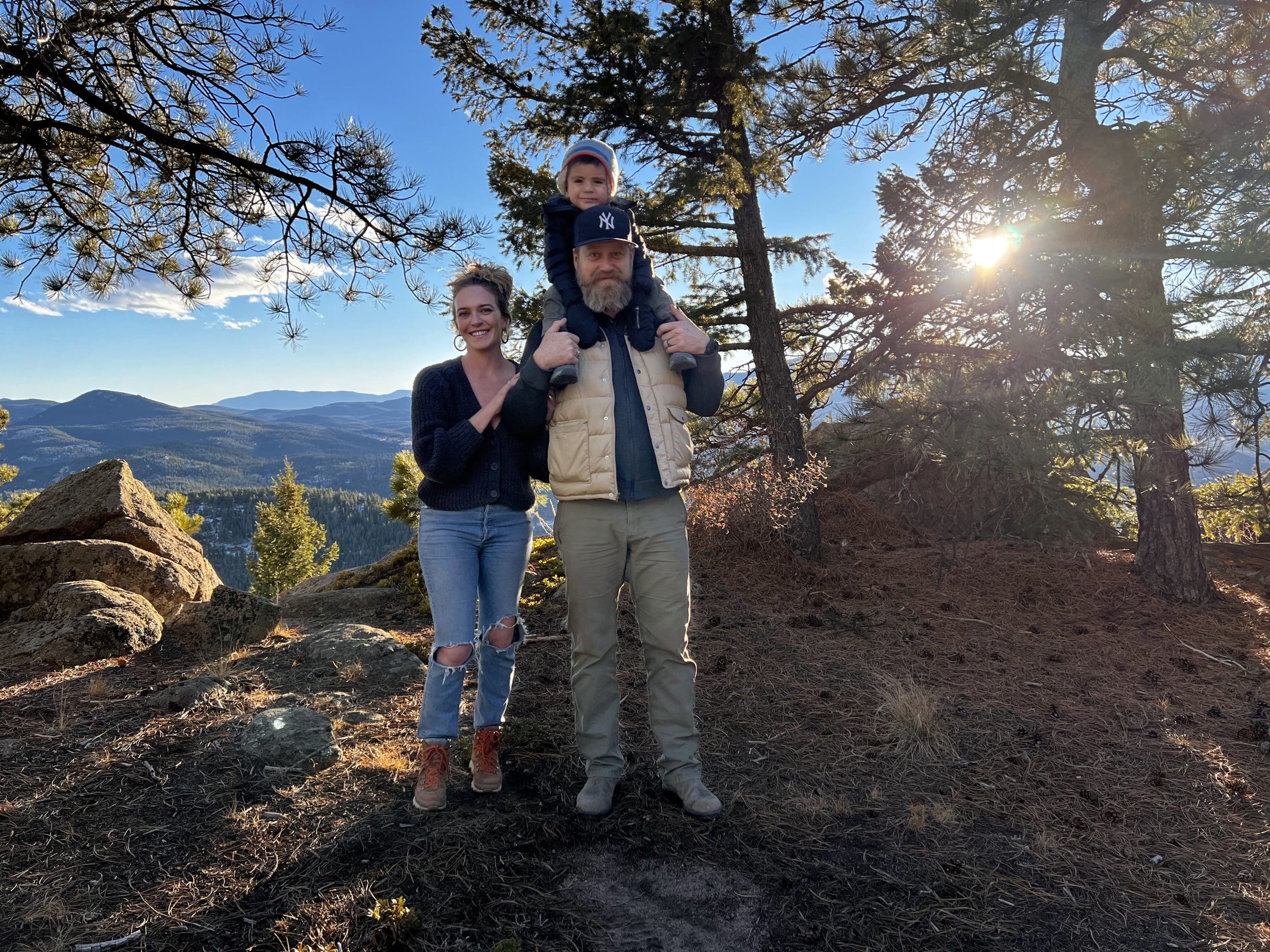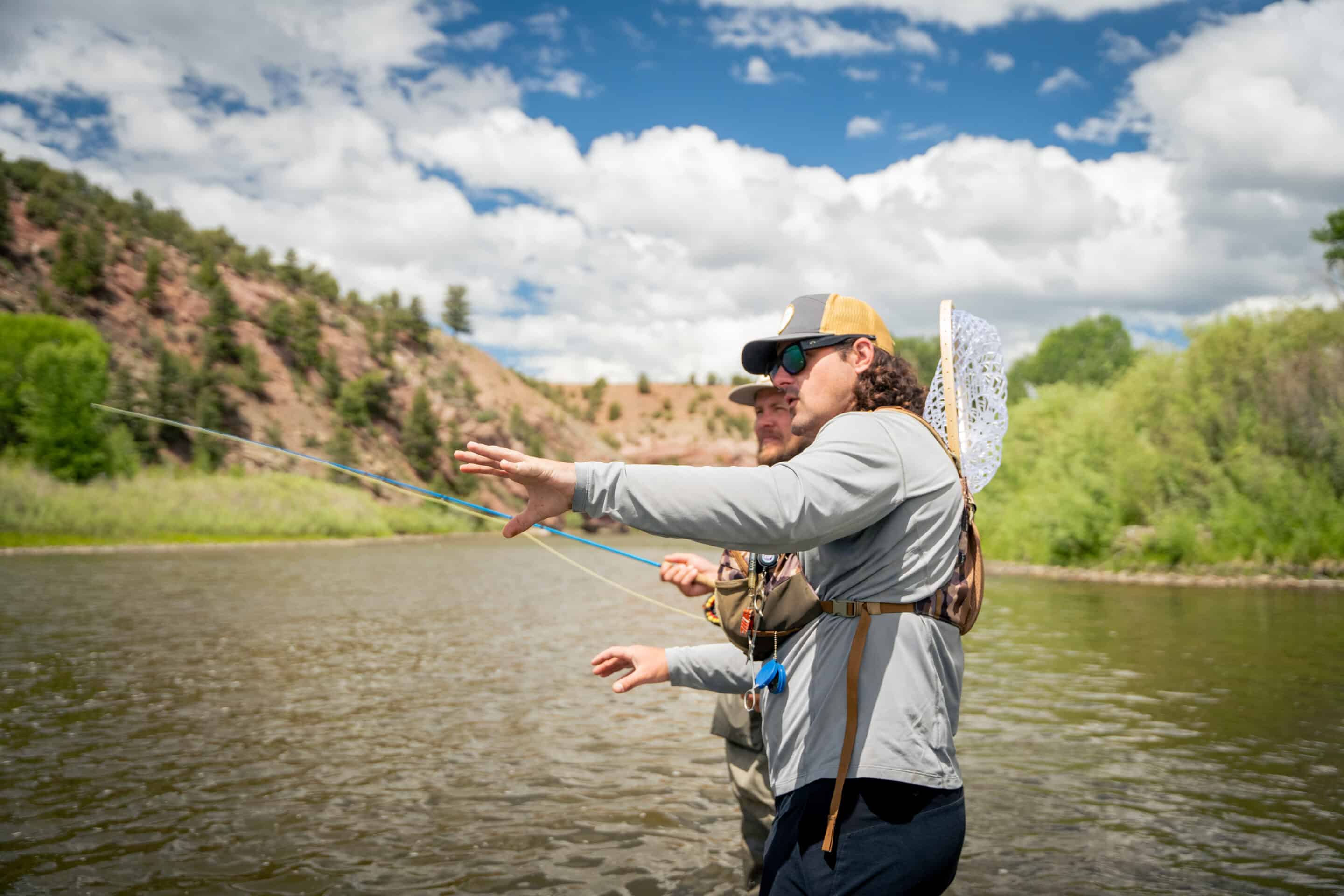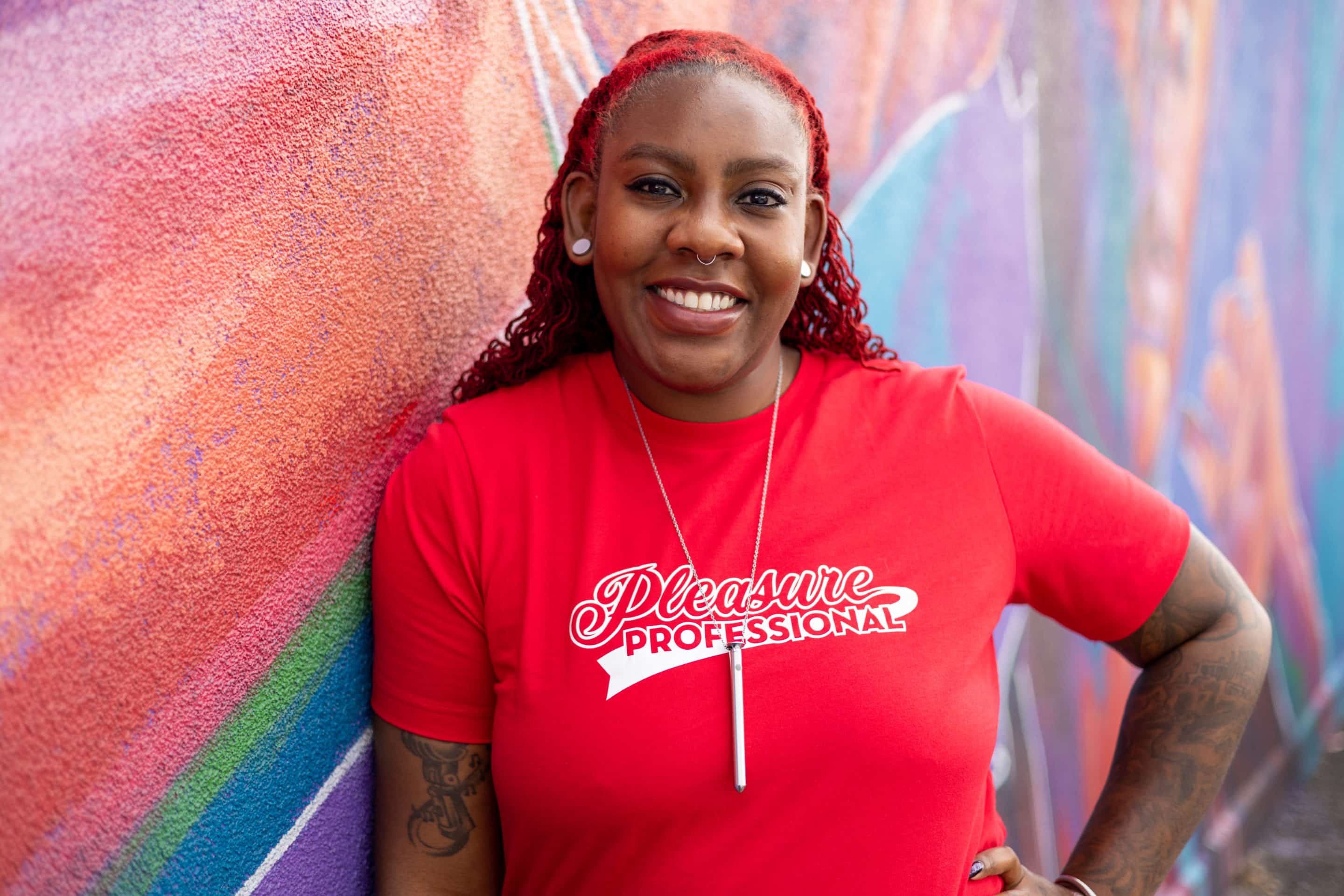//Fishing the Good Fight founder and executive director Jennings Hester works with a retreat attendee on the river. Photo provided by Fishing the Good Fight.
Editor’s note: This story repeatedly uses “men” in reference to cisgender men specifically. It’s a story that is usually outside our purview, but an important one nonetheless.
Men’s mental health has been at the forefront of national discussion for years as mass shootings in the U.S. rise exponentially.
And while these discussions have the potential to demonize all people with mental illnesses—and a variety of other factors come into play like access to firearms and increasing white supremacist radicalization—the lack of access to mental healthcare is a root cause.
In research conducted by The Violence Project co-founders, Drs. Jillian Peterson and James Densley, a clear and consistent profile emerged: early childhood trauma, which developed into self-loathing along with hopelessness, isolation and rejection from their peers.
According to Peterson, many people don’t realize that these mass shootings are almost always a case of violent suicide. But where mass shootings differ from a traditional case of suicide is that self-hate often turns the blame on a group, like classmates or racial and religious minorities. Nationally, men were 40 times more likely to commit a mass shooting and four times more likely to die by suicide than women in 2020.
“In terms of mass shootings, I think there’s absolutely a direct correlation to mental health,” said Jennings Hester, founder and executive director of the Colorado-based nonprofit Fishing the Good Fight. “I don’t know how you can say that someone who goes and shoots up a school is not struggling with something regarding their mental health.”
And while Peterson and Densley’s research suggests that a data-backed, mental health-based approach could identify and address the next mass shooter before they even pick up a firearm, politicians seem disinterested in turning words into action.
That’s where individuals like Hester are stepping in. Fishing the Good Fight’s mission is to improve all lives by serving men facing mental health challenges, which Hester calls an epidemic.
“Because of the butterfly effect, [the impact] a man improving his mental health has on a spouse, his family, his friends, his coworkers, really the entire community [is significant],” Hester said. “When we have depressed men, and men that are struggling with substance abuse throughout the community at the level that we do, it has a negative impact on everyone.”
Founded in November 2019, Hester said the organization’s mission and program reflect his personal struggles with mental health. He started experiencing depression and anxiety from a young age and, like many men, was unaware it was something that could be treated. Having idolized professional athletes and action heroes who he thought represented the peak of masculinity, Hester said these struggles made him feel weak. Society told him to hold in his emotions and be tough.
“I was a part of that culture growing up, and it’s just what was taught to me,” Hester said. “And I was this macho football player and big tough guy. Of course I wasn’t willing to admit that I was struggling and couldn’t process this stuff.”
So after working on his mental health through therapy, he set out to create the resource he wished he had access to two decades prior.
Fishing the Good Fight takes a three-pronged approach to providing mental health care to men in Colorado, utilizing fly fishing as a way to get them in the door. Hester said fly fishing could realistically be replaced with any other activity—like mountain biking, rafting or climbing—but the nature element, requiring one to be present in the moment, is crucial. The second prong is introducing members to a supportive community where they feel safe to talk about their trauma. The final, and most important, piece is the group and individual therapy.
“I think when somebody says they’re going to therapy, there’s a stigma attached to that,” said Matt Aporta, who attended a retreat in October 2021. “Whereas saying ‘I’m going away for a weekend to [go fishing],’ it makes it easier to participate in the group setting where I think everyone can relate one way or another to each other. You find your people.”
During the summer, the program runs several weekend-long fly fishing retreats around the state.
During colder months when fishing is less accessible, they run a 12-week closed group, capped at eight members. Instead of fishing, the activity switches to fly tying. And, year-round, Fishing the Good Fight has an open group setting for 50 people at the 16th Street YMCA.
Initially, Aporta attended solely to support his long-time friend Hester. Before the weekend trip, he was averse to traditional therapy, having been forced into it by his mother from a young age, he said. But on the river, he quickly found a safe place where he was allowed to be vulnerable.
“For me, it was like therapy no longer was an answer or a solution,” Aporta said. “For me, it was not the way to work through things. Then fast-forward, I did my first group therapy session and spent a weekend on the Fishing the Good Fight retreat and had never felt better coming out of it.”

While the details came later, the foundations for the EP began taking shape when she was working on her degree.
Like many things, there is a generational aspect to how people deal with mental illness and express their emotions. We often learn how to process our emotions from our parents or role models. Aporta’s wife, Mary Beth LaRue, said the work Fishing the Good Fight is doing to reframe masculinity has benefited their whole family. Their 4-year-old son Angel has been able to learn emotional health from a man who exemplifies it.
“I’ve seen now [that he] is showing Angel that it’s good to cry, showing Angel that it’s good to have feelings and that it’s OK to express yourself, even in anger,” LaRue said. “For a 4-year-old to start to see that and to know that his dad—who is this giant human and presence—is a safe space for him is really beautiful.”
Aporta said he works with his son on breathing exercises and putting words to his emotions, rather than hitting walls or throwing things, which is a coping mechanism he often sees among children Angel’s age.
In learning to process emotions healthily, folks are more likely to recognize when they need to seek additional help before it’s too late.
Colorado has the ninth-highest suicide rate in the country, with 20.5 suicides per 100,000 residents. Although those deaths were highest among non-Hispanic white men, a report by the Colorado Health Institute stated that BIPOC people who died by suicide were just as likely to report suffering from depression but about half as likely to have sought treatment. The report stated this is due in large part to social stereotypes, cultural differences, stigma, a lack of resources and medical racism.
Fishing the Good Fight’s goal is to democratize the river and make it accessible to all. The folks who are interested in continuing with the sport get access to wholesale-priced gear, which significantly reduces the cost. But they’re also attempting to do the same with mental health services. They provide financial assistance for all of their programs and individual therapy. Hester said the majority of guys who attend receive financial aid, and covering those costs is the biggest part of their $150,000 annual budget.
“I was in that situation where I had to decide between paying for mental health services or declining my mortgage, and I don’t want other guys to be in that situation,” Hester said. “We want to make sure that finances are never a barrier for anyone that wants to be involved.”
Hester said the programs are open to gay men but do not cater to transgender men or nonbinary folks. He is very careful with his wording, saying Fishing the Good Fight absolutely supports these demographics, but they’re not who the organization is equipped to work with. The founder added that there are already groups out there who know how to provide the best care, and Fishing the Good Fight should stay in the lane they know best.
“There’re a lot of groups that work with trans people, and it’s just not our focus,” Hester said. “We’re totally open to the trans community in terms of financial assistance and everything. It’s just not where we focus, so it’s not a group that we’ve targeted and tried to work with.”
Although the organization may not be expanding to cater to trans men or nonbinary folks, Hester is looking forward to bringing the program to more diverse groups. Looking at photos from past retreats, the overwhelming majority of men are white. Hester said this has a lot to do with the demographics of the state and the sport. Fishing the Good Fight is looking to open up 10 new chapters in 2023, with the goal of each acting as a hub for the surrounding region.
As the sport of fly fishing has become more accessible to BIPOC and LGBTQ+ folks, so too has mental healthcare. There’s still a long way to go, but Aporta said even the shift in how we frame therapy is helping men take the first step. The community aspect of Fishing the Good Fight’s programs also creates a safety net long after the retreats.
“Just being around other men that are there because they know that they have heavy shit that they can’t handle on their own, whether they talk about it or not, creates a safe space for people to build new relationships and have people that they can talk to,” Aporta said.
For Hester, he said it feels good to come full circle. He’s spent years learning how men affect those around them, improving his mental health and that of others. He mentioned that the week before he spoke with Ms. Mayhem that his therapist told him he was “breaking the cycle.”
“It absolutely starts with our own vulnerability and setting that tone and showing that we have no issue talking about it,” Hester said. “It’s just a normal conversation for our guys.”
Enjoyed this story? Help us keep the lights on! Supporting local press ensures the stories you want to read keep coming, become a member for free today! Click here.





0 Comments